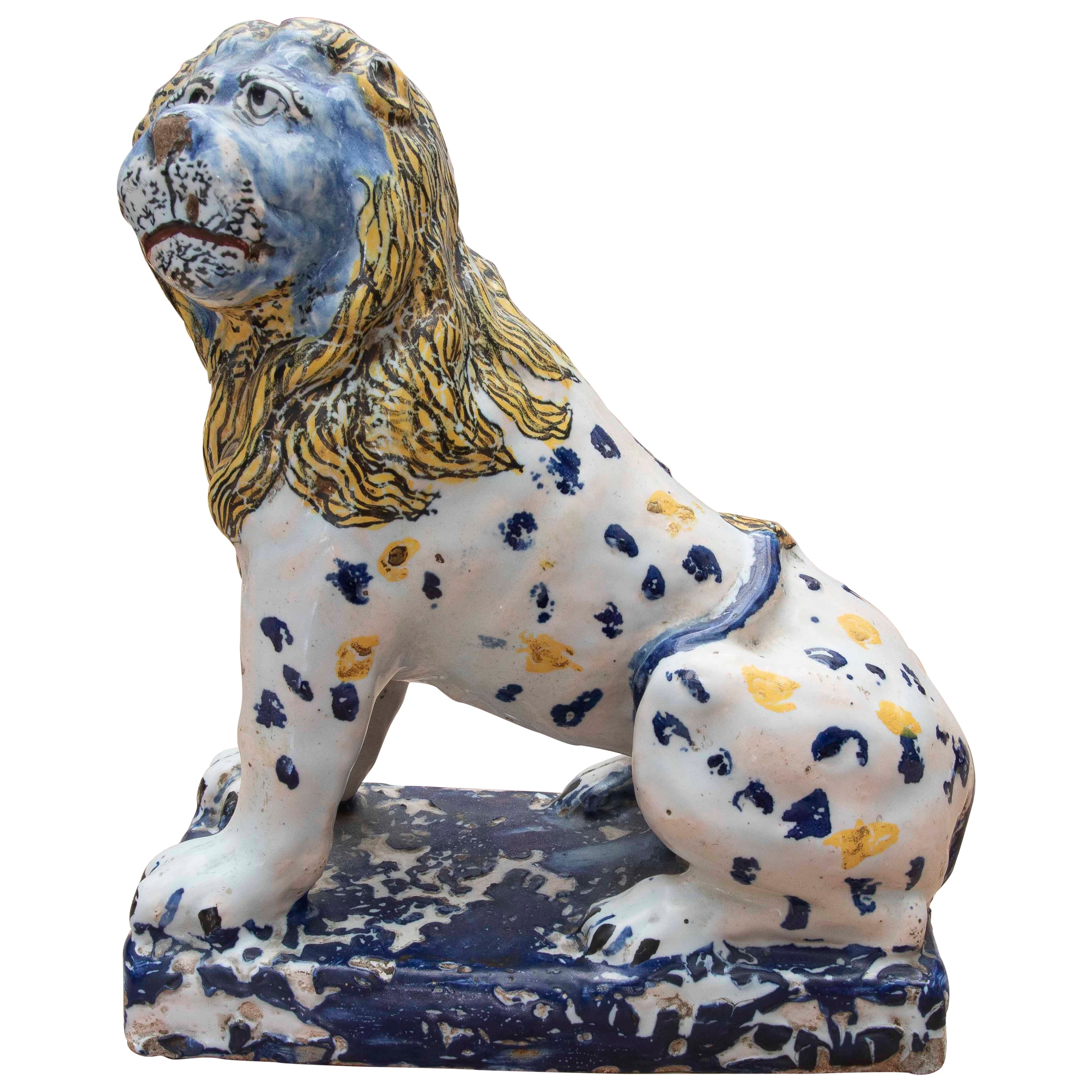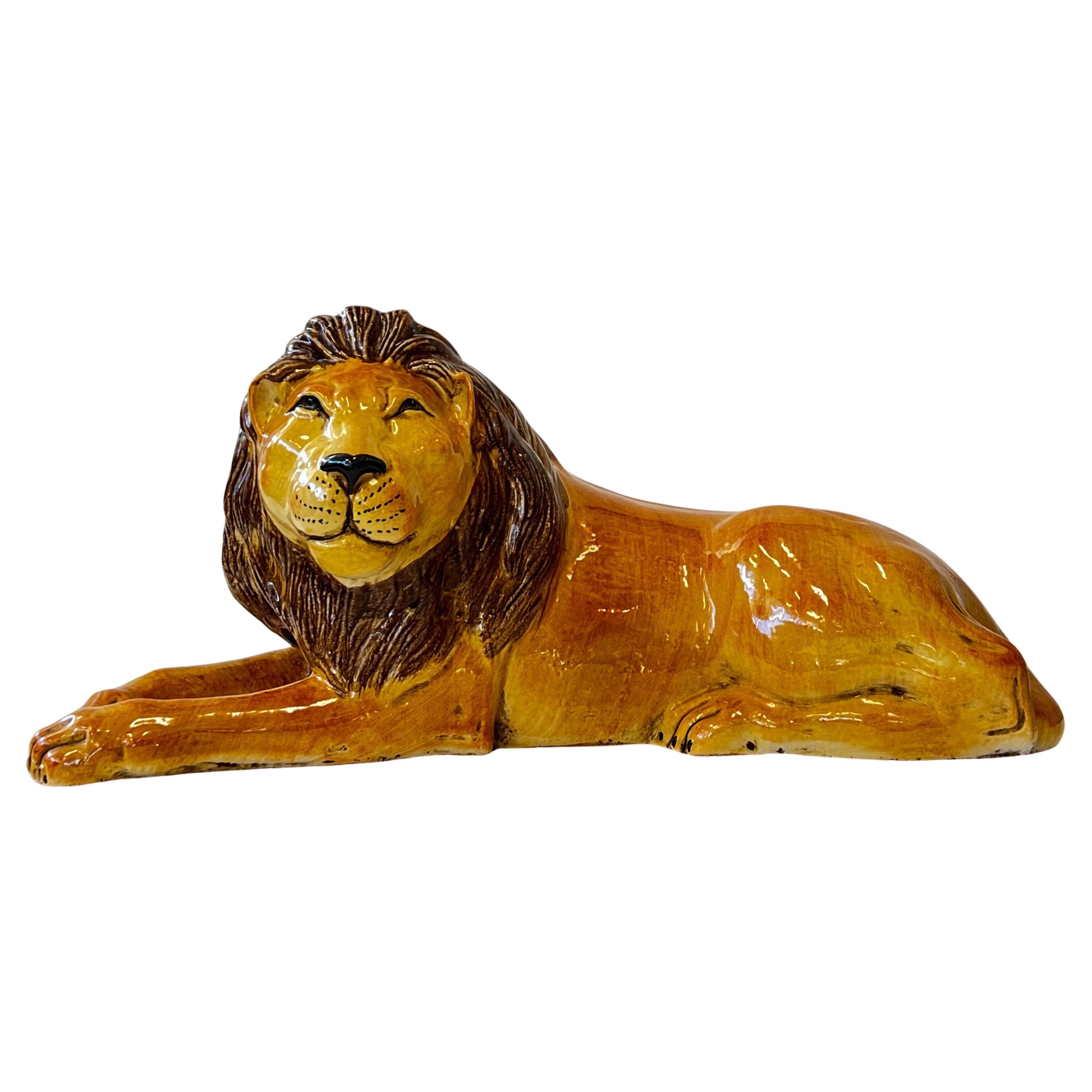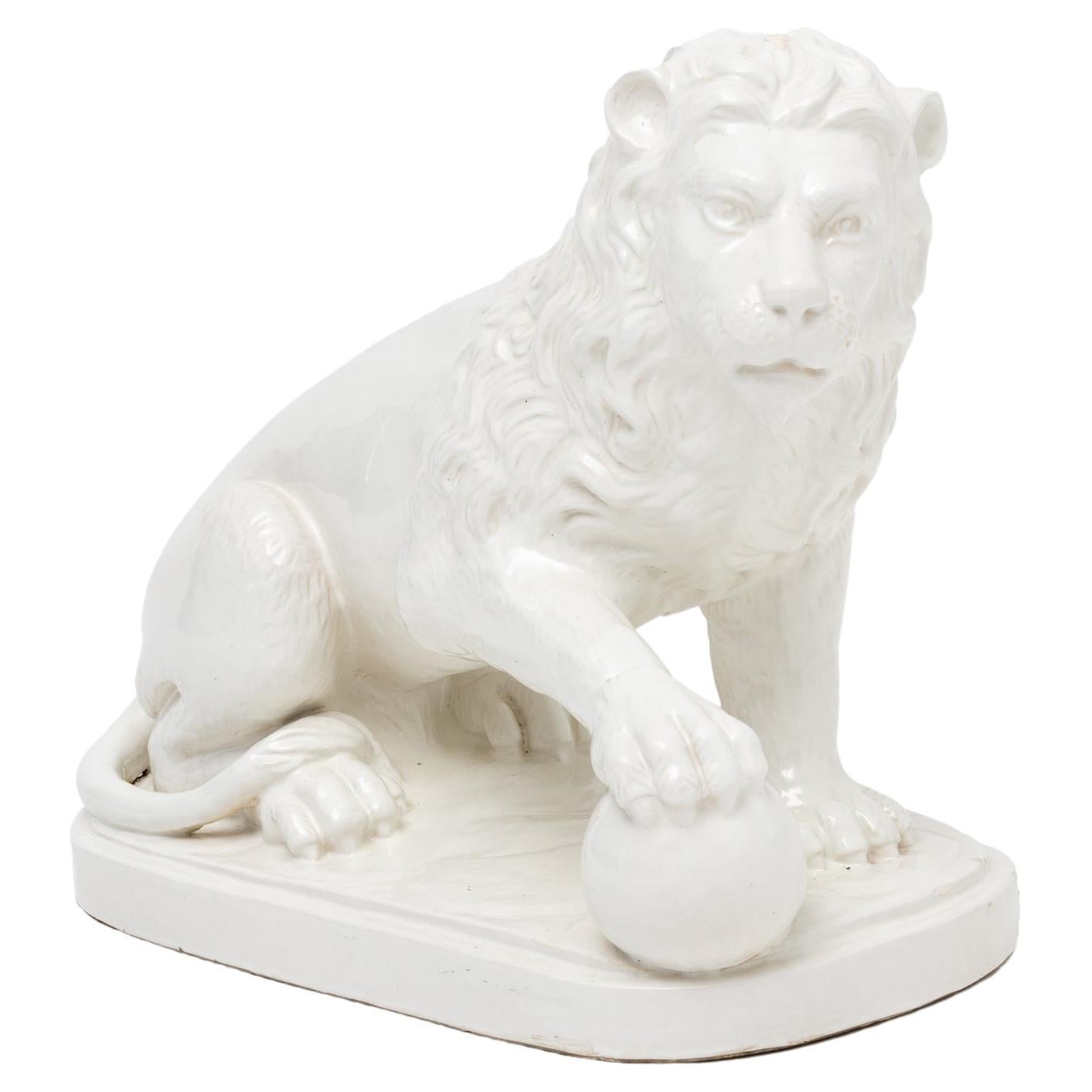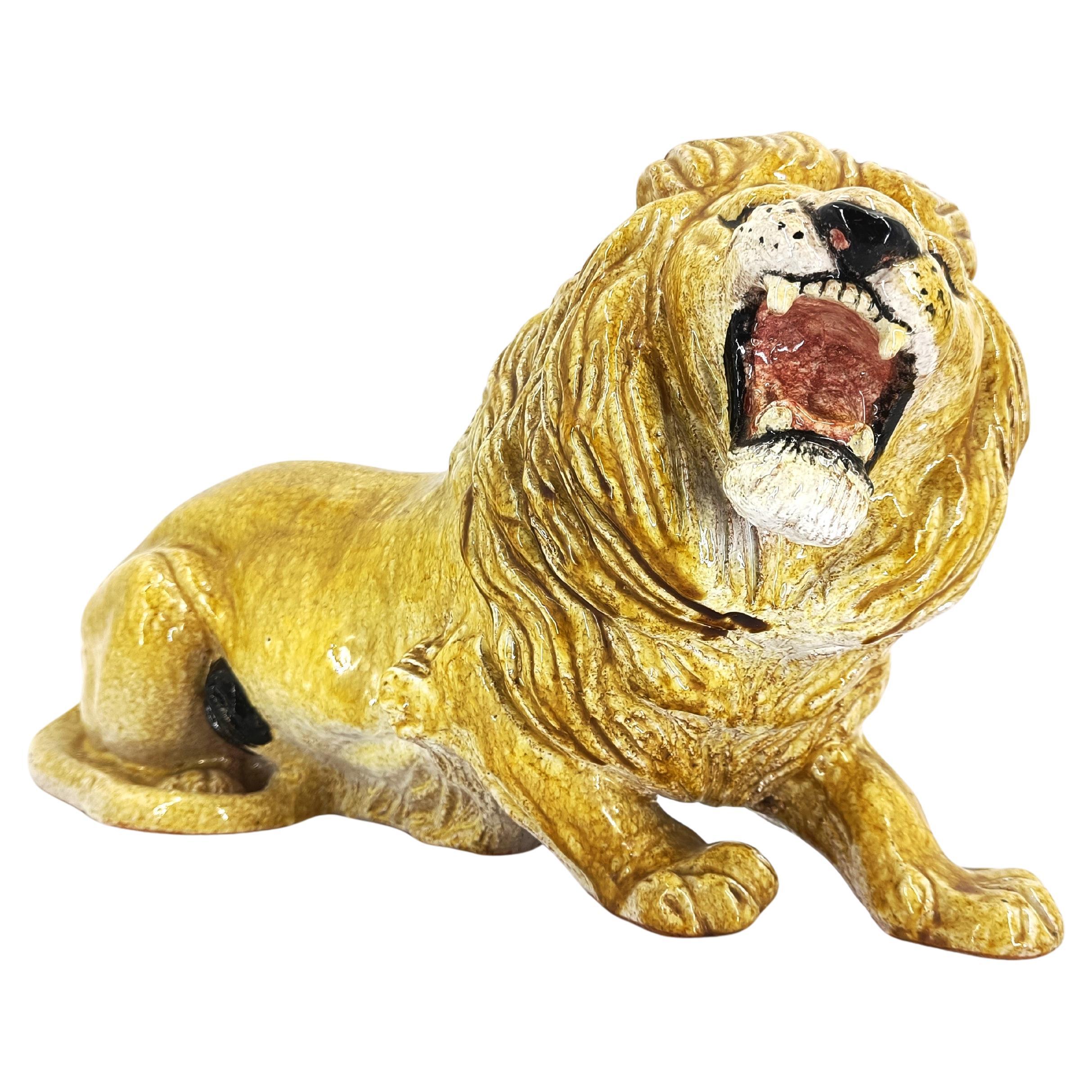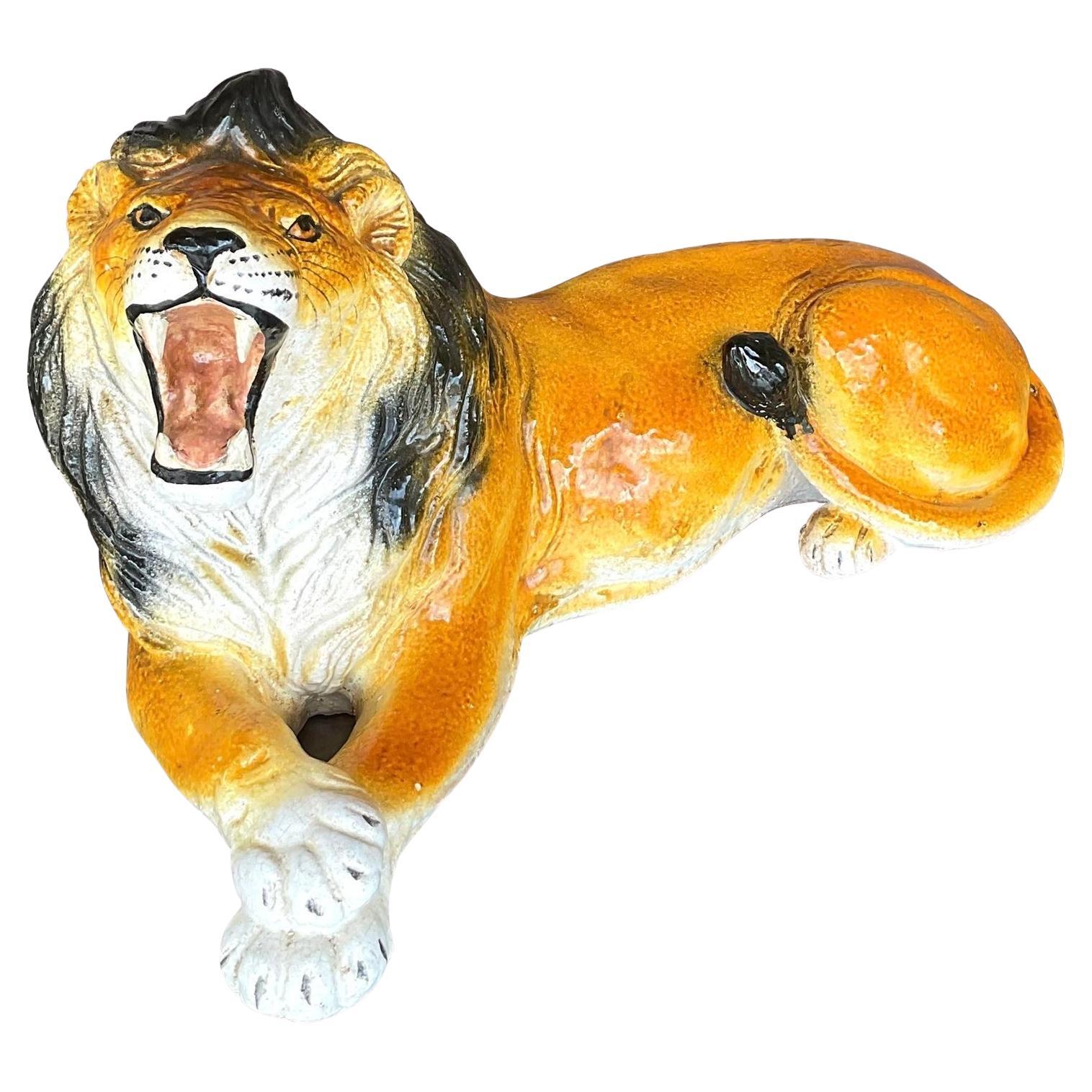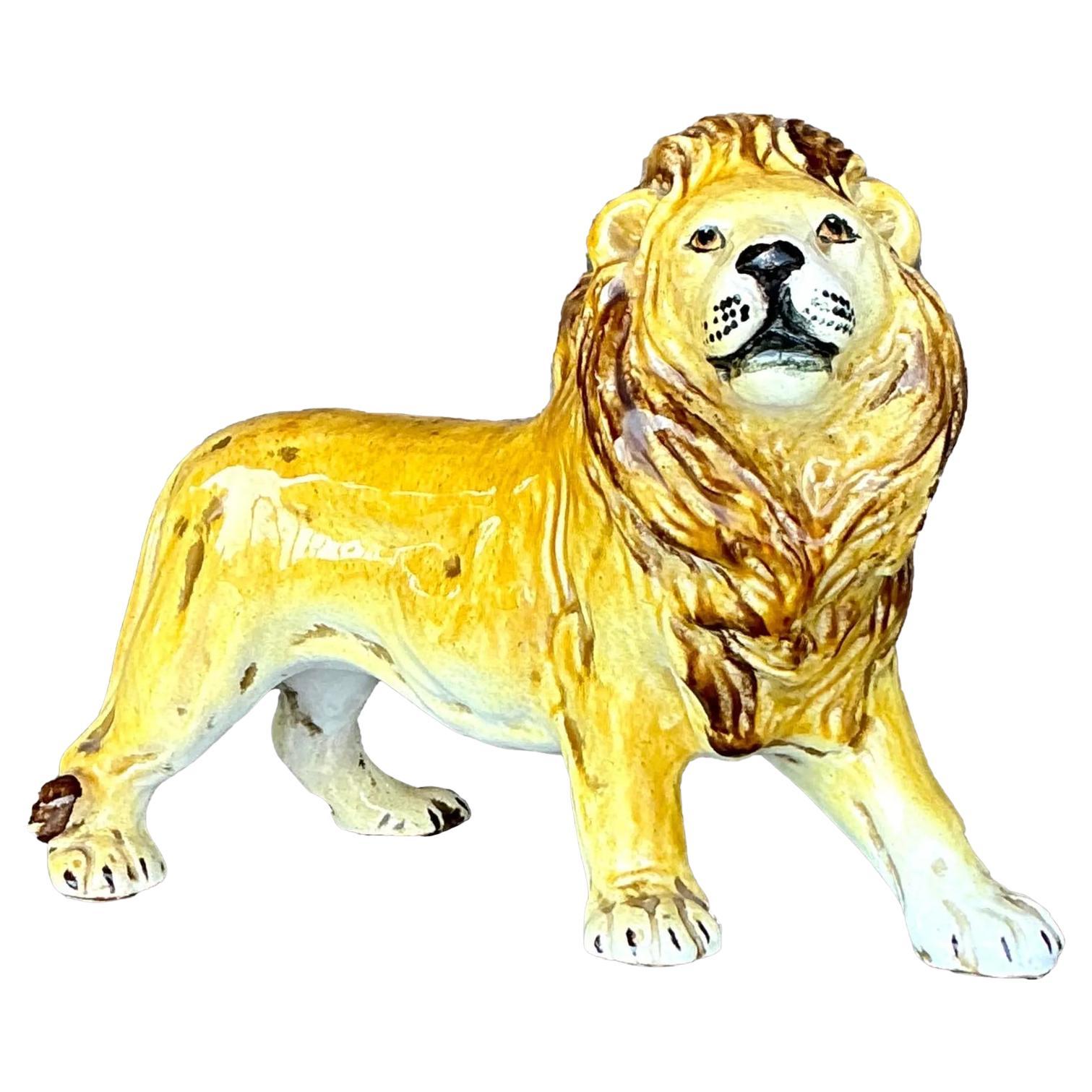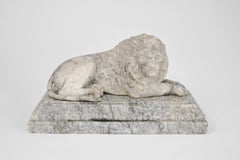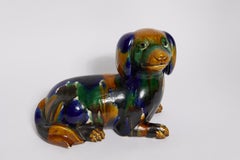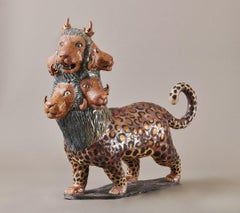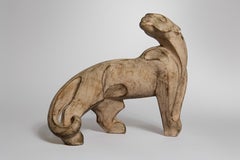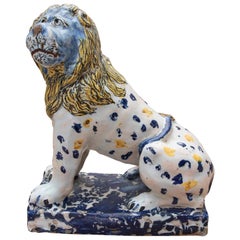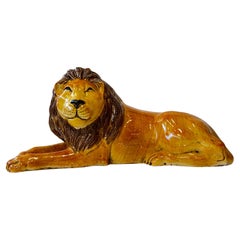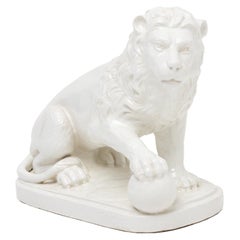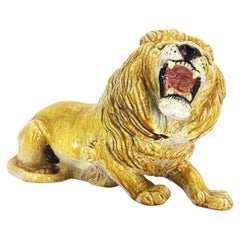Items Similar to French Faience Tuilerie Normande Mesnil de Bavent Ceramic Figure of a Lion
Want more images or videos?
Request additional images or videos from the seller
1 of 9
UnknownFrench Faience Tuilerie Normande Mesnil de Bavent Ceramic Figure of a Lion19th Century
19th Century
$3,000
£2,256.72
€2,614.30
CA$4,229.38
A$4,703.35
CHF 2,468.63
MX$57,355.11
NOK 31,198.60
SEK 29,249.93
DKK 19,512.86
About the Item
French Faience Tuilerie Normande Mesnil de Bavent
Figure of a Lion, 19th Century
Ceramic on a rectangular plinth
Impressed 'TN Bavent' to underside
8 x 8 x 14 inches
Tuilerie Normande Mesnil de Bavent is a French pottery factory.
The first pottery factory here was set up in 1842 by industrialist Maurice Comptet. He bought a bit of production organization to an artisanal craft, enabling mass production of tiles, pots and architectural ornaments. The Tuilerie du Mesnil de Bavent (tuilerie means tile) business flourished and his sons inherited. One stayed in Bavent to make pots, the other developed a factory mainly producing pots, in Caen.
Bavent pottery became so famous a piece of pottery from the factory was included in the design for the Roman House at the 1989 L’Exposition Universelle Paris exhibition. A finial apparently but we can’t spot it, perhaps it was a surface decoration.
By the turn of the century the Tuilerie was owned by M. Aimé Jacquier. M. Jacquier appreciated the uniqueness of the more creative designs that came out of his pottery; sturdy enough to withstand extremes of weather and beautiful enough to be considered art.
His brother Francis was a sculptor who created many wonderful clay animal designs and that are still reproduced here today.
The pottery changed hands a few times until 1931, when another Maurice took over. He combined his engineering knowledge, business sense and encouraged the potter’s creativity. The time between 1931 and the outbreak of WW2 is seen as a golden age. During German occupation production slowed to almost nothing. Then on 6 June 1944 the Allies arrived on Normandy beaches. Just 10km from Bavent.
After heavy fighting at the Merville gun battery and destroying the bridge at Varenville, British and Canadian paratroopers fought to take the Mesnil crossroads just along the road from Bavent. The crossroads is on a high ridge and had views in all directions to German positions and the Allied seaborne invasion at Sword beach. Around Bavent the Commandos experienced World War One-style trench warfare, with the Germans well dug in. Fighting continued to be intense in this key strategic area for seven exhausting, terrible days.
The Allies would be forced to continue repelling the enemy for a further two months until Bavent was finally released on 17 August, just one week before Paris. At one stage an HQ and makeshift hospital were set up in the Bavent pottery. During the conflict the village of Bavent was destroyed, the pottery buildings badly damaged and, we have been told, bullet holes can still be seen today in some of the statues and buildings on the site.
With hard work and perseverance, production at the pottery was able to restart in June 1945. By January 1946 tile production was up to 1000 tons per month supporting the rebuilding of a liberated Normandy.
The creative side of the pottery was maintained until the late 1960’s when new owners cared little for the expensive to produce ornaments. By 1987 just the tile production was due to be sold and the architectural ornament workshop abandoned. Skills saved over centuries would be lost forever.
Fortunately for the Le Mesnil Tuilerie at Bavent and the villas of Normandy, a wonderful determined lady called Martine Kay Mouat decided to buy the creative workshop at Bavent. She was an apprentice at here in the 1960’s and understood perfectly what would be lost if the workshop closed.
Martine saved unique style of Bavent and the livelihoods of the pottery artisans. Her daughter Dominique joined in 1992 and still manages the pottery today.
The site is now a centre of excellence and includes a museum, an exhibition space for contemporary art and sculpture and a separate studio for artists in residence to come and use in exchange for demonstrations and lessons.
The workshop still produces classic pieces from vintage moulds, as well as new pieces and restoration of old damaged creations. It also acts as a custodian of local pottery heritage, saving old moulds from closing potteries across the region.
In 2007 the Potterie du Mesnil de Bavent was quite rightly awarded the Living Heritage Company label (‘Entreprise du Partrimoine Viviant’ – EPV ) by the Ministry of Economy, Finance and Industry.
- Creation Year:19th Century
- Dimensions:Height: 8 in (20.32 cm)Width: 14 in (35.56 cm)Depth: 8 in (20.32 cm)
- Medium:
- Period:
- Condition:
- Gallery Location:Beachwood, OH
- Reference Number:1stDibs: LU1768216317472
About the Seller
5.0
Platinum Seller
Premium sellers with a 4.7+ rating and 24-hour response times
Established in 1975
1stDibs seller since 2022
35 sales on 1stDibs
Typical response time: <1 hour
- ShippingRetrieving quote...Shipping from: Beachwood, OH
- Return Policy
Authenticity Guarantee
In the unlikely event there’s an issue with an item’s authenticity, contact us within 1 year for a full refund. DetailsMoney-Back Guarantee
If your item is not as described, is damaged in transit, or does not arrive, contact us within 7 days for a full refund. Details24-Hour Cancellation
You have a 24-hour grace period in which to reconsider your purchase, with no questions asked.Vetted Professional Sellers
Our world-class sellers must adhere to strict standards for service and quality, maintaining the integrity of our listings.Price-Match Guarantee
If you find that a seller listed the same item for a lower price elsewhere, we’ll match it.Trusted Global Delivery
Our best-in-class carrier network provides specialized shipping options worldwide, including custom delivery.More From This Seller
View AllMarble Figure of a Recumbent Lion, 19th Century
Located in Beachwood, OH
Figure of Recumbent Lion, 19th Century
Carved gray veined marble
4.5 x 8 x 4.5 inches
Category
19th Century Figurative Sculptures
Materials
Marble
Early 20th Century drip glaze ceramic dog sculpture in the style of Tang/Sancai
Located in Beachwood, OH
Dog in the style of Tang/Sancai, Early 20th Century
Drip glaze ceramic
9.5 x 13 inches
Sancai is a versatile type of decoration on Chinese pottery using glazes or slip, predominantl...
Category
Early 20th Century Figurative Sculptures
Materials
Ceramic, Glaze
Beast of the Apocalypse, 21st Century Contemporary Ceramic of Animal
Located in Beachwood, OH
Kristen Newell (American, b. 1989)
Beast of the Apocalypse, 2019
Glazed stoneware, epoxy and acrylic
Signed and dated on bottom
24 x 28 x 10 inches
Kri...
Category
2010s Figurative Sculptures
Materials
Stoneware, Epoxy Resin, Acrylic
Brutalist Late 20th Century Figurative Panther Sculpture
Located in Beachwood, OH
Alexsander Danel (Estonian, 1940-2001)
Brutalist Panther Sculpture, 1996
Signed 'Danel' and 'Austin Sculpture' to back leg
13.5 x 16.5 inches
Alexsander Danel was born in Estonia and graduated from both the Moscow Industrial Arts School and the Moscow Fine Arts Academy. He earned many awards and distinctions in the Soviet Union, including "Best Work of the Year" in 1973 for his monumental work commemorating the history of the Russian Wars, installed in Kirov. Alexsander Danel emigrated to the U.S. in 1976, after spending a year in Rome where he sculpted set designs for Fellini's "Cassanova" and the Napoli Theater production of "Aida". After settling in New York, he completed commissions for Rockefeller Plaza and Radio City Music Hall. In 1992, he held his first one person show exhibiting computer generated...
Category
1990s Figurative Sculptures
Materials
Ceramic
Early 20th Century Cowan Pottery Ceramic Sculpture of a Native American
By F. Luis Mora
Located in Beachwood, OH
F. Luis Mora (American, 1874-1940)
Native American, c. 1930s
Ceramic
Stamped on bottom, Cowan Pottery
9 x 7 x 5 inches
Francis Luis Mora was one of the better-known American artists...
Category
1930s Figurative Sculptures
Materials
Ceramic
Terracotta Bust of a Young Gentleman, Late 18th Century French Sculpture
Located in Beachwood, OH
After Philippe-Laurent Roland (French, 1746-1816)
Bust of a Young Man, 1772
Terra cotta set on painted wood pedestal
Signed and dated at back
16.5 x 11 x 8 inches
Philippe-Laurent R...
Category
1770s Figurative Sculptures
Materials
Terracotta
You May Also Like
18th Talavera Polychrome Pottery Lion Figure
Located in Marbella, ES
Sculpture of a seated rampant lion, modeled in glazed earthenware and hand-decorated in vivid shades of cobalt blue, mustard yellow, and touches of black, typical of the traditional ...
Category
Antique 18th Century Spanish Animal Sculptures
Materials
Ceramic
Italian Ceramic Lion Sculpture
Located in Palm Springs, CA
Large Italian hand painted ceramic lion sculpture from the 1970’s.
In beautiful vintage condition.
Retains the made in Italy label.
Measurements: 11” Deep, 27” Wide, 12” High.
Category
Vintage 1970s Italian Hollywood Regency Animal Sculptures
Materials
Ceramic
Portuguese Faience Lion, Viúva Lamego
Located in Lisboa, PT
The Portuguese Faience Lion from Viúva Lamego is a notable piece of ceramic art that reflects the rich tradition of Portuguese faience, a type of tin-glazed pottery. Viúva Lamego, fo...
Category
20th Century Portuguese Statues
Materials
Faience
$2,722 Sale Price
40% Off
Italian Glazed Terracotta Lion sculpture, 1960s
Located in Leuven, Vlaams Gewest
Hand painted glazed terracotta lion sculpture with open mouth.
Hand painted sculpture with a lot of presence.
Good condition
1960's - Italy
Dimensions:
Height: 25cm
Width: 44cm
...
Category
Vintage 1960s Italian Hollywood Regency Animal Sculptures
Materials
Terracotta
Vintage Italian Glazed Ceramic Lion
Located in West Palm Beach, FL
Introduce a regal touch to your décor with this Vintage Italian Glazed Ceramic Lion. Showcasing exquisite Italian craftsmanship and a stunning glazed finish, this majestic piece embo...
Category
Mid-20th Century North American Animal Sculptures
Materials
Ceramic
Vintage Italian Glazed Ceramic Lion
Located in West Palm Beach, FL
Make a bold statement with this striking vintage Italian glazed ceramic lion—an exquisite decorative sculpture that blends artisan craftsmanship with timeless character. Handcrafted ...
Category
Mid-20th Century Italian Mid-Century Modern Animal Sculptures
Materials
Ceramic
More Ways To Browse
Figural Ceramic Sculpture
Paris Pottery
Lion Finial
Roman Lion
Clay Architectural Sculpture
Ceramic Lions
Antique Hospital
Golden Lion
Sculpture Of Two Lions
Lion Plinth
Antique Battery
Ceramic Plinths
Figural Studio Pottery
Studio Pottery Figure
Antique French Tiles
Antique Clay Pot
Antique German Pottery
Lion Sculpture Ceramic
